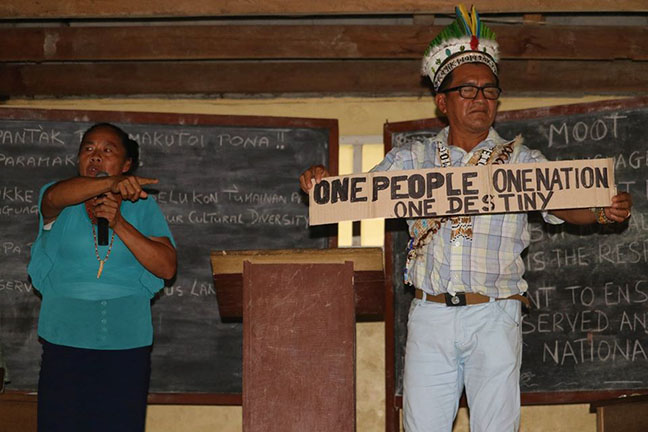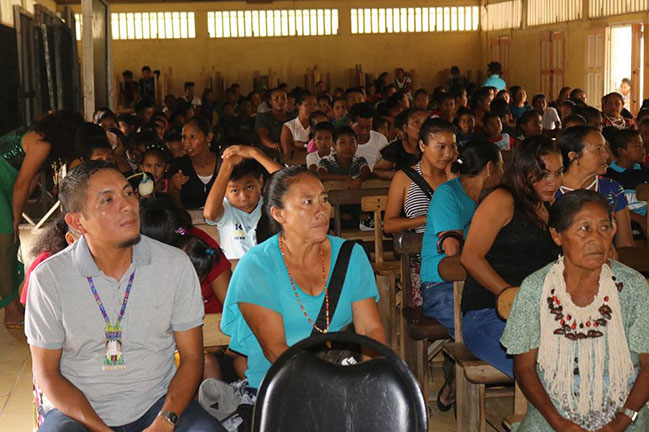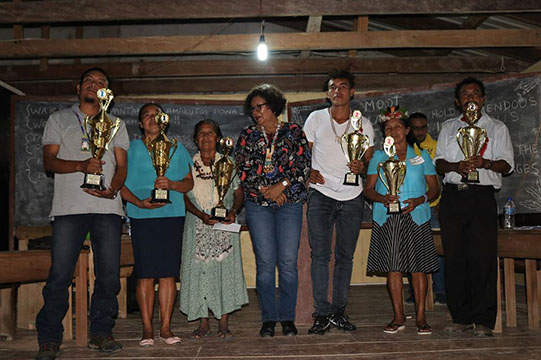Just over a week ago, the Ministry of Indigenous Peoples’ Affairs concluded the local observances of the International Year of Indigenous Languages with a debate in the village of Paramakatoi, in the Potaro-Siparuni region, where participants exchanged arguments in fluent Patamona.
The moot for the debate was “Indigenous languages hold tremendous benefits, not just for Indigenous peoples but for all Guyanese, hence it’s the responsibility of the government to ensure that the languages are preserved and promoted nationally.”
The proposition and opposition teams each consisted of three members, all of whom argued that all persons in Guyana should learn the languages of the Amerindian tribes in order to preserve them.
They proposition team’s first speaker, Marlon Williams, used the example of one the shop owners in the village, a man called “Sammy,” as evidence of the need for persons to speak the language. He said some people who are not indigenous might move into a village where the people speak a certain language and the only way to communicate with them is by learning their language just as the shop owner, whose family went to Paramakatoi with missionaries when he was just three years old, had to learn in order to live and survive in the village.
While Williams spoke of the language barriers, his team’s best speaker, Molly Simon, emphasised the need for the language to be documented so that the next generation does not forget it and the traditions can be sustained.
Meanwhile, the members of the opposing team also pointed out that while they agreed with the arguments of their counterparts on the proposition side, there were other issues which should be focused on rather than the languages of the Indigenous people. Among those cited was the amenities for Indigenous villages.
Dat Nagalla, the opposition’s first speaker, was very passionate about the government not being responsible for persons learning the languages of the Indigenous peoples, but he did not disagree that persons should learn them. He said that it was actually the people’s responsibility to teach the language. Another factor touched on was the necessity of the language.
For both teams, the promotion of the language was a point touched on throughout the debate. In the end, the proposing team was declared the winner. This was decided after the rebuttal, when the proposing team continued with arguments for the Indigenous languages to be promoted at schools and for persons who speak these Languages to not be ashamed but embrace their traditional tongues.
However, there were no losers in the debate as each participant received a cash prize for participating along with a trophy.
The debate was one of four planned in order to observe International Year of Indigenous Languages. Other debates were to be held in the Akawaio, Wapishana and Makushi languages.
The Department of Public Information had reported at the start of the year that a total of $36 million was allocated in the 2019 national budget to promote the nine Indigenous languages, through the collaboration with the UN’s Indigenous Peoples Department of Economic and Social Affairs.
Activities planned for the year were to fall under three thematic areas: supporting the revitalisation and maintenance of indigenous languages through the creation of more materials and content; preserving indigenous languages, creating access to education, information and knowledge in and about indigenous languages for indigenous children, young people and adults; and mainstreaming the knowledge areas and values of indigenous peoples and cultures within broader social-cultural economic and political domains, as well as cultural practices such as traditional sports and games.
Other activities that were planned throughout the year included a Language Revival Programme, the erection of welcome signboards at the entrance of each village in their respective language, radio and television programmes, a children’s book, a tourist handbook, and a short story competition.
The UN has said that language policies need to be complemented by policies that empower indigenous peoples politically, economically and socially so that they can make their livelihoods in their own communities without having to give up their language and culture or to migrate out of economic need. The survival of these languages, it has noted, will depend on the prosperity and political influence of the communities which speak them.











